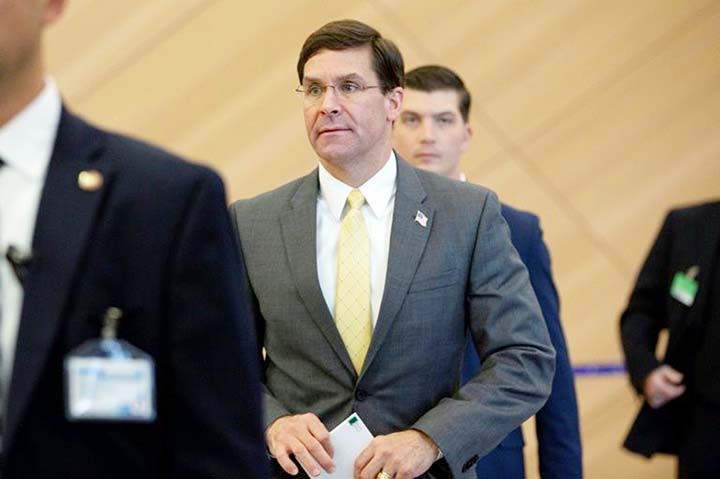
AP, Brussels :
The United States will send armoured vehicles and combat troops into eastern Syria to keep oil fields from potentially falling into the hands of Islamic State militants, U.S. Defense Secretary Mark Esper said.
It was the latest sign that extracting the military from Syria is more uncertain and complicated than President Donald Trump is making it out to be. Though Trump repeatedly says he is pulling out of Syria, the reality on the ground is different.
Adding armored reinforcements in the oil-producing area of Syria could mean sending several hundred U.S. troops-even as a similar number are being withdrawn from a separate mission closer to the border with Turkey where Russian forces have been filling the vacuum.
On Friday, Esper described the added force as “mechanized,” which means it likely will include armored vehicles such as Bradley armored infantry carriers and possibly tanks, although details were still be worked out. This reinforcement would introduce a new dimension to the U.S. military presence , which largely has been comprised of special operations forces not equipped with tanks or other armored vehicles.
Esper spoke at a news conference at NATO headquarters in Brussels, where he consulted with American allies.
Sending an armored force to eastern Syria would partially reverse the ongoing shrinkage of the U.S. troop presence in Syria. Trump has ordered the withdrawal of nearly all 1,000 U.S. troops who had been partnering with a Syrian Kurdish-led militia against the Islamic State group. That withdrawal is proceeding even as Esper announced the plan to put reinforcements in the oil-producing area.
Speaking to reporters Friday at the White House, Trump said the U.S.-brokered agreement with Turkey to halt its offensive against U.S.-supporting Syrian Kurdish fighters was a win for his administration. That offensive began after Trump announced U.S. troops would not stand in the way, though he also said the U.S. would punish Turkey’s economy if the country acted inhumanely.
He also said anew on Friday that “we’re getting our troops out” of Syria, without mentioning Esper’s announcement.
“We are doing well in Syria, with Turkey and everybody else that we’re dealing with,” Trump said. “We have secured the oil. … We have a couple of people that came knocking, we said don’t knock. And I think I would say that things are going very well.”
White House officials would not clarify whom he was referring to as “knocking.”
The U.S. special envoy for Syria, James Jeffrey, said in Geneva on Friday he had talked to a Russian official about an unspecified issue in Syria’s oil region.
“We are currently very concerned about certain developments in the south, in the Deir el-Zour area,” Jeffrey said. “I’ve talked to my Russian colleague about that and we’re having other contacts with the Russians concerning that situation. We think it is under control now.”
Although Esper did not mention the size of the U.S. reinforcements, it could total several hundred troops because fuel-guzzling tanks and other armored vehicles depend on a large supply and logistical support group. One official, who discussed the planning on condition of anonymity because some details remained to be agreed, cautioned that tanks might eventually be eliminated from the mix because of logistical challenges, including air transport.
Russian and Turkish leaders have now divided up security roles in northeast Syria following Trump’s abrupt troop withdrawal from the Turkey-Syrian border region. The American move triggered widespread criticism that the U.S. administration had abandoned the Syrian Kurdish fighters who fought alongside the U.S. against IS for several years.
Esper’s announcement came even as Trump again indicated in tweets that the U.S. military mission in Syria is complete. He previously has acknowledged a willingness to help protect the oil fields in eastern Syria, suggesting they could benefit the Kurds as well as the United States, although those resources belong to the Syrian government.

